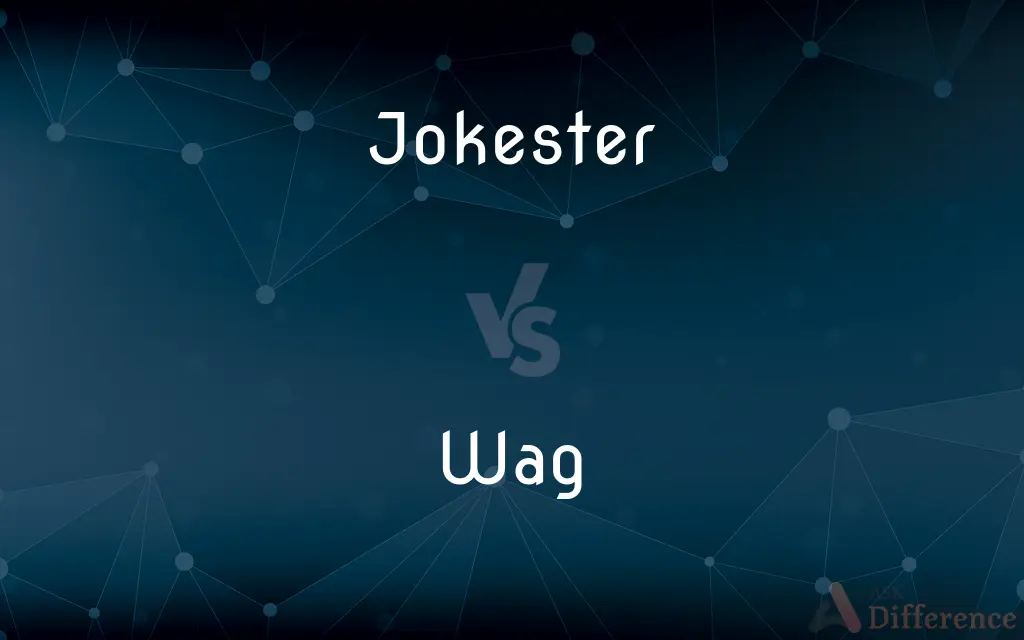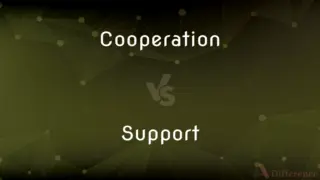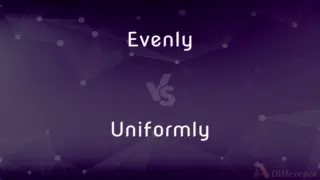Jokester vs. Wag — What's the Difference?
By Urooj Arif & Fiza Rafique — Updated on March 26, 2024
A jokester is someone known for making jokes and entertaining others, while a wag is often a witty person who uses clever humor, especially in teasing or mocking.

Difference Between Jokester and Wag
Table of Contents
ADVERTISEMENT
Key Differences
Jokesters are individuals who enjoy making others laugh through various forms of humor, including jokes, pranks, and comedic performances. They are often seen as the life of the party, bringing joy and laughter to social gatherings. On the other hand, wags are known for their sharp wit and the ability to make humorous observations or comments that can be both amusing and cutting. Wags often use their humor to poke fun at societal norms or highlight the absurdities of life.
While jokesters might rely on a broader range of comedic styles—from slapstick to sophisticated humor—wags typically lean towards verbal irony and clever wordplay. Jokesters are appreciated for their ability to lighten the mood and entertain, whereas wags are valued for their quick thinking and the depth of their humor, which often requires a certain level of intelligence or cultural knowledge to fully appreciate.
Jokesters engage in humor that is generally accessible and designed to appeal to a wide audience. Their aim is to entertain and amuse, making them popular figures in both personal and professional settings. In contrast, the humor of a wag might not always be immediately apparent to everyone, as it can include subtle references or rely on a deeper understanding of the context, making their humor more selective in its appeal.
The social role of jokesters and wags can vary significantly. Jokesters are often sought after in social settings for their ability to create a fun and lively atmosphere. Wags, however, might be appreciated in more intellectual circles or in situations where their biting wit and insightful commentary can shine. Despite their differences, both contribute to the vibrancy of social interactions, offering levity and reflection through their unique approaches to humor.
Both jokesters and wags play important roles in culture and entertainment. Jokesters might be more prominently featured in comedy clubs, television, and films, where their humor can be shared with a broad audience. Wags, with their penchant for wordplay and satire, might find themselves excelling in writing, public speaking, or as commentators, where they can articulate their observations on life and society.
ADVERTISEMENT
Comparison Chart
Definition
Someone who makes jokes and entertains.
A witty person known for clever humor.
Humor Style
Broad, ranging from slapstick to complex.
Sharp wit, clever wordplay, and satire.
Aim
To entertain and amuse a wide audience.
To tease, mock, or make insightful quips.
Audience
General, appreciates various humor types.
Often more selective, appreciates wit.
Social Setting
Sought after in many social gatherings.
Valued in intellectual or specific circles.
Compare with Definitions
Jokester
A person who enjoys making others laugh through jokes or amusing actions.
The class jokester could always be counted on to lighten the mood.
Wag
Uses clever wordplay and satire.
The literary wag delighted in puns and playful jabs at authors.
Jokester
Engages in humor to entertain and bring joy.
Every family gathering is more fun when the jokester is around.
Wag
Appreciated for intellectual humor.
At the dinner party, the wag entertained with anecdotes full of historical wit.
Jokester
Often uses physical comedy or visual gags.
The party's jokester entertained everyone with a hilarious mime performance.
Wag
Often comments on societal norms with humor.
The local wag wrote a column that humorously critiqued town politics.
Jokester
Appeals to a broad audience with their humor.
She's a natural jokester, making friends laugh with her witty observations.
Wag
Their humor can include subtle references.
The conversation sparkled with the wag's clever allusions to classic films.
Jokester
Known for a lighthearted approach to humor.
Our office jokester brought in a whoopee cushion for April Fools' Day.
Wag
A person known for their witty and often sarcastic humor.
The company's wag had a quip for every occasion, keeping meetings lively.
Jokester
"Jokester" is a science fiction short story by American writer Isaac Asimov. It first appeared in the December 1956 issue of Infinity Science Fiction, and was reprinted in the collections Earth Is Room Enough (1957) and Robot Dreams (1986).
Wag
(especially with reference to an animal's tail) move or cause to move rapidly to and fro
His tail began to wag
The dog went out, wagging its tail
Jokester
One who tells or plays jokes; a joker.
Wag
Play truant from (school).
Jokester
A person who tells jokes; a joker.
Wag
A wife or girlfriend of a sports player, typically characterized as having a high media profile and a glamorous lifestyle.
Jokester
A person who plays practical jokes.
Wag
To move briskly and repeatedly from side to side, to and fro, or up and down
The dog's tail wagged.
Jokester
Jester, court jester.
Wag
To move rapidly in talking. Used of the tongue.
Jokester
A person who enjoys telling or playing jokes
Wag
(Archaic) To be on one's way; depart.
Wag
To move (a body part) rapidly from side to side or up and down, as in playfulness, agreement, or admonition
Wagged his finger at the giggling students.
Wag
The act or motion of wagging
A farewell wag of the hand.
Wag
A humorous or droll person; a wit.
Wag
To swing from side to side, such as of an animal's tail, or someone's head, to express disagreement or disbelief.
Wag
To play truant from school.
Wag
(obsolete) To be in action or motion; to move; progress.
Wag
(obsolete) To go; to depart.
Wag
An oscillating movement.
The wag of my dog's tail expresses happiness.
Wag
A witty person.
Wag
To move one way and the other with quick turns; to shake to and fro; to move vibratingly; to cause to vibrate, as a part of the body; as, to wag the head.
No discerner durst wag his tongue in censure.
Every one that passeth thereby shall be astonished, and wag his head.
Wag
To move one way and the other; to be shaken to and fro; to vibrate.
The resty sieve wagged ne'er the more.
Wag
To be in action or motion; to move; to get along; to progress; to stir.
"Thus we may see," quoth he, "how the world wags."
Wag
To go; to depart; to pack oft.
I will provoke him to 't, or let him wag.
Wag
The act of wagging; a shake; as, a wag of the head.
Wag
A man full of sport and humor; a ludicrous fellow; a humorist; a wit; a joker.
We wink at wags when they offend.
A counselor never pleaded without a piece of pack thread in his hand, which he used to twist about a finger all the while he was speaking; the wags used to call it the thread of his discourse.
Wag
A witty amusing person who makes jokes
Wag
Causing to move repeatedly from side to side
Wag
Move from side to side;
The happy dog wagged his tail
Common Curiosities
Is wag humor always sarcastic?
Not always, but wags often use sarcasm as part of their witty commentary on life and societal norms.
Do jokesters and wags serve different roles in society?
While both serve to entertain and add levity, jokesters often do so in a broader, more inclusive manner, whereas wags might offer more pointed, intellectual humor that critiques or observes.
How does one become known as a wag?
Becoming known as a wag often involves consistently demonstrating quick wit, clever commentary, and the ability to make insightful humorous observations that resonate with an audience.
Can a person be both a jokester and a wag?
Yes, a person can exhibit qualities of both, depending on the audience and situation, blending broad humor with clever wit.
What role does cultural background play in the humor of jokesters and wags?
Cultural background significantly influences what is considered funny, the types of jokes or witty remarks made, and how humor is received by others, making some jokes or comments more relatable or understandable to certain audiences.
What makes a wag different from a jokester?
A wag uses sharp wit and often satirical humor, focusing on clever wordplay and intellectual humor, while a jokester employs a broader range of comedic styles to entertain and amuse.
What kind of humor is most effective in social settings?
The effectiveness of humor in social settings depends on the audience and context; broad, inclusive humor is widely appreciated, while witty, intellectual humor can be more effective in certain circles.
Are jokesters popular in every social circle?
While jokesters are generally well-liked for their ability to entertain, their popularity may vary based on the group's dynamics and the type of humor they employ.
Which is more appreciated in professional settings, a jokester or a wag?
It depends on the context and culture of the workplace. A wag's wit might be appreciated in environments that value intellectualism and satire, while a jokester's broad appeal might be better suited for creating an inclusive, fun atmosphere.
Is it easier to be a jokester or a wag?
Both require a unique skill set; being a jokester might demand a versatile sense of humor and the ability to connect with a wide audience, while being a wag requires quick thinking, a strong command of language, and cultural literacy.
How do jokesters and wags adapt their humor for different audiences?
Adapting humor involves understanding the audience's preferences, sensitivities, and the context of the occasion, allowing for the adjustment of content and delivery style accordingly.
Can humor be a coping mechanism for jokesters and wags?
Yes, humor is often used as a coping mechanism, providing a way to deal with challenging situations, express feelings indirectly, or find light-hearted perspectives in difficult times.
Are there any famous historical figures known for being wags?
Many historical figures, including writers like Oscar Wilde and Mark Twain, are renowned for their wit, often using it to critique society and human nature.
How does one balance being funny with maintaining respect in professional environments?
Balancing humor with respect involves being mindful of the content and timing of jokes, ensuring they are appropriate for the workplace and do not offend colleagues or undermine professionalism.
Do jokesters and wags face criticism for their humor?
Both may face criticism, especially if their humor is misunderstood, deemed inappropriate for the context, or crosses boundaries of taste and sensitivity.
Do wags use their humor for specific purposes?
Wags often use their humor to highlight absurdities, critique societal norms, or provide commentary on current events, making their humor not just entertaining but also thought-provoking.
Can humor from a wag be considered offensive?
Yes, the satirical or mocking nature of a wag's humor can sometimes be perceived as offensive, especially if the audience misunderstands the intent or the humor touches on sensitive topics.
How important is timing in the humor of both jokesters and wags?
Timing is crucial for both jokesters and wags; knowing when to deliver a punchline or make a witty comment can make the difference between a joke landing well or falling flat.
Is being a jokester a talent or a skill that can be learned?
Being a jokester can be a natural talent for some, but aspects of comedic timing, understanding audience reactions, and developing a range of humorous material can also be learned and honed.
Share Your Discovery

Previous Comparison
Cooperation vs. Support
Next Comparison
Evenly vs. UniformlyAuthor Spotlight
Written by
Urooj ArifUrooj is a skilled content writer at Ask Difference, known for her exceptional ability to simplify complex topics into engaging and informative content. With a passion for research and a flair for clear, concise writing, she consistently delivers articles that resonate with our diverse audience.
Co-written by
Fiza RafiqueFiza Rafique is a skilled content writer at AskDifference.com, where she meticulously refines and enhances written pieces. Drawing from her vast editorial expertise, Fiza ensures clarity, accuracy, and precision in every article. Passionate about language, she continually seeks to elevate the quality of content for readers worldwide.














































